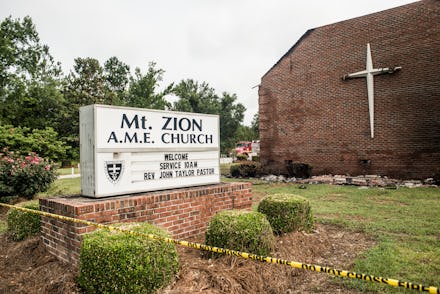American Muslims Lent a Hand to Six Black Churches That Burned This Summer

$49,745 is no small amount of money for a scrappy online fundraiser. But by Thursday afternoon, that's how much 23-year-old Faatimah Amat-Allah Knight had collected to help rebuild the Southern churches damaged by fires this summer.
In an inspiring effort, Knight and more than 1,100 supporters are trying to raise $50,000 by July 18 to support their fellow faith communities. Like most of the coalitions involved in her campaign, Knight is Muslim — making this a push that might seem odd to some, considering its interfaith dimensions.
But Ramadan — the Muslim holy month of penance and self-reflection currently underway — is typically marked by such giving. And Knight's efforts shed light on an important point:
"The Muslim community and the black community are not different communities," she writes on the fundraiser page. "We are profoundly integrated in many ways, in our overlapping identities and in our relationship to this great and complicated country."
Indeed, although Muslims in the United States are commonly conflated with Arab ethnic features, the reality is more complex. According to the Pew Research Center, 23% of American Muslims identify as black. That number jumps to 59% when accounting for those whose parents were born in the U.S., making black Americans the largest multi-generational U.S.-born Muslim population.
This is key when discussing the broader significance of the burning churches. In the two weeks after a white gunman murdered nine black parishioners at Emanuel African Methodist Episcopal Church in Charleston, South Carolina, on June 17, six Southern churches were affected by fires. Among the burned structures were four predominantly black churches, and as of late June officials suspected two fires were the work of arsonists.
The first was in Knoxville, Tennessee, followed by Macon, Georgia, Charlotte, North Carolina, and Warrenville, South Carolina. Another two churches caught fire, allegedly by accident, one in Tallahassee, Florida, and one back in South Carolina, this time in Greeleyville. A predominantly white church in Gibson County, Tennessee, burned down when it was struck by lightning on June 23, according to the Los Angeles Times.
The spectre of racial terror conjured by the image of these churches burning goes a long way back in American history. As J.T. Roane, a Columbia University Ph.D. candidate in history, told Mic's Darnell Moore in June, "Across the diaspora, black spiritual and religious spaces — whether a clearing in the woods or a stone and mortar church — have nurtured rebellion, and that's why they continue to be under siege."
From the 1963 bombing of the 16th Street Baptist Church in Birmingham, Alabama, to the string of 32 "suspicious" black Southern church fires in the mid-1990s, it's a specter that resonates among black people of all faiths — Christian, Muslim and otherwise. "We are connected to black churches through our extended families," Knight added on the fundraising page, "our friends and teachers, and our intertwined histories and convergent present."
It's still unclear what caused the most recent fires throughout the South. But if this outpouring of support is any indication, it constitutes yet another example of black Americans uniting — along with recent protests against anti-black police and vigilante violence — against the myriad tragedies facing all black communities.
h/t Al Jazeera